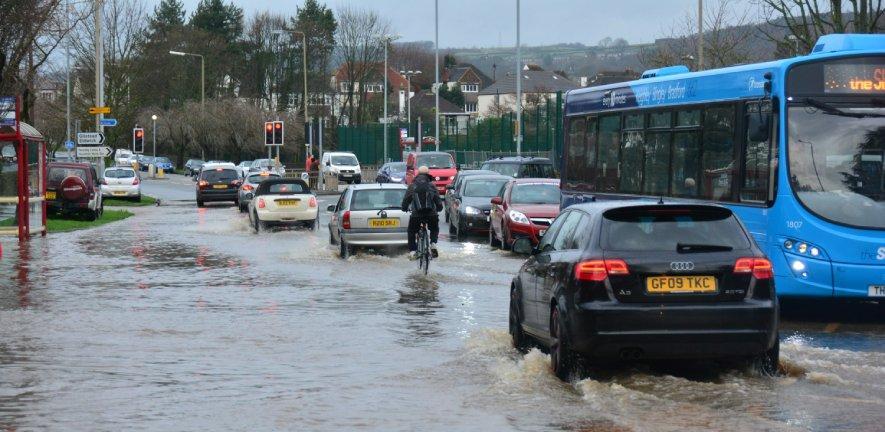
24 July 2024 - A new government offers the UK a reset on its energy transition. But decisions need to be made fast, for long-term gains towards a decarbonised economy, says Beverley Cornaby of the Corporate Leaders’ Group.
The new UK government needs to look beyond the first 100 days.
Any farmer (or gardener like myself) in the UK right now would moan about how the weather is damaging their yields - making growing seasons unpredictable and challenging. Whether it’s lettuce wilting faster or tiny tomatoes not reaching their full size on the vines, we’re all noticing the difference.
In just the last two years, the UK has experienced two of the warmest years since records began in 1884. This year, we experienced one of its wettest winters - you can tell by how quickly fields and roads flood as soon as there is more rainfall. Now in July, we are potentially headed towards the wettest summer in 100 years.
Predictions show that it’s only going to get worse. This means more frequent and extreme weather patterns, from drought to torrential rain.
The weather’s ever-increasing unpredictability is likely to be highly disruptive to many of us, from individual homeowners to businesses. You just have to think back to the summer of 2022, when the rails buckled and roads melted, to consider what this may look like in terms of disruption to major infrastructure - both in terms of how it brought life to a standstill and how much it costs to repair.
And costing is key. Flooding alone cost the UK economy $1.6 billion in 2018-19, and estimates suggest that within this decade, the UK is likely to spend approximately $43.8 billion dealing with climate-change-related natural disasters.
The UK has prioritised action to reduce its carbon emissions - both domestically and in seeking to gain influence on the international stage. In doing so, we have made progress in reducing our carbon footprint through a combination of policies and private-sector investment. The UK is the first of the largest 20 nations to have halved our emissions since 1990, whilst growing our economy by 80%.
However, pessimistic, anti-net-zero rhetoric and policy reversals from government over the past couple of years have cost the UK in reduced investor and consumer confidence. In their latest progress report, the Climate Change Committee (CCC) highlight the impact of certain policy decisions on making it less likely the UK will meet its 2030 carbon emissions target. They have singled out the decision to allow 20% of households to be exempt from the fossil fuel boiler phase-out as particularly damaging.
But it is not just policies to reduce emissions that have been scrutinised and found wanting. The CCC has criticised the current National Adaptation Programme, stating that it “lacks the pace and ambition to address growing climate risks which we are already experiencing”. The solution is one that businesses have been calling for repeatedly - what the CCC says is needed is “a vision that includes clear objectives and targets”.
Maintaining momentum
To deliver this requires stronger leadership and, in just their first week, the new UK government is showing clear signs of trying to provide that leadership. We need urgent action and the new government has acted fast—removing restrictions on onshore wind planning, ceasing new oil and gas licenses in the North Sea and not contesting the court case against the Whitehaven coal mine.
While the UK’s major businesses applaud this swift approach, there will be strong resistance, especially from those who voted for parties campaigning on manifestos calling for a reversal of net-zero targets. The new government will need to hold its nerve in this area.
The new party on the scene, Reform, may only have five seats in Parliament compared to Labour’s 412, however, the reality is that Reform had a much higher proportion of the vote. Reform will have significant space to build from this position while the Conservative party remains divided and arguing over its future. What this means is that you still have a significant voice in society questioning the government on whether strong action on net zero is the right thing to do.
Questions and challenges will be coming from multiple directions. Many Liberal Democrat and Green MPs (left-leaning parties) have been elected on platforms which prioritise the protection of the local environment and will be a voice for communities that may not agree with the decisions being made. A prime example of this is in East Anglia where a new Green MP is already calling for a pause to new pylons that would link offshore wind to the grid. Infrastructure such as this is critical to a revised energy system and the government will get judged at a community level on how they deliver these plans.
Against this backdrop, all eyes will be on how the government responds to the CCC’s progress report and its advice. The bar has been set pretty low by the previous administration, but the new government still has a lot to prove.
To-do list
In its advice, the CCC listed ten priorities, including actions on renewable energy, planning, electrification, carbon removals, skills, adaptation and nature-based solutions.
This wide-ranging “to-do list,” some of which will be quicker to implement than others, is what the CCC would like to see the new government deliver by the end of 2024. However, to succeed in implementing these, they will need to work in partnership with investors, businesses and consumers to bring them on the journey and ensure these key stakeholders feel listened to.
We need ambitious policies, yes, but what’s more important is how and when they are implemented. And we're running out of time.
Long-term thinking is not just about the first 100 days, strong climate leadership is about setting the country up for its 2030 goals and beyond. Not everyone will agree, but it’s important that climate leadership trickles down, so that a sustainable future becomes the new norm.
First published by Foresight Media - listen to an audio version of this article.





